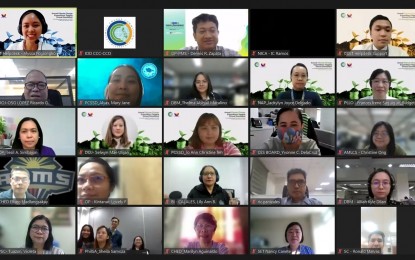
CLIMATE BUDGETING. The Climate Change Commission (CCC) and the Department of Budget and Management convene national government instrumentalities in an online workshop for the annual Climate Change Expenditure Tagging Orientation, shown in this undated screengrab. The workshop aims to ensure the systematic incorporation of climate considerations within the government's budget. (Photo by CCC)
MANILA – The Climate Change Commission (CCC) and the Department of Budget and Management (DBM) recently convened national government instrumentalities (NGIs) for the annual Climate Change Expenditure Tagging (CCET) Orientation, in a bid to effectively mainstream climate action in the government’s plans and programs.
The workshop is in support of President Ferdinand R. Marcos Jr.’s 8-point socioeconomic agenda and the implementation of climate change provisions in the Philippine Development Plan 2023-2028.
Aligned with the National Budget Call for FY2025, this year's CCET Orientation provided up-to-date information on NGIs’ climate budget programming.
It was attended by 351 NGIs, comprised of budget officers, planning officers, and climate change focals of National Government Agencies (NGAs), agency members of the Program Convergence Budgeting (PCB) Risk Resiliency Program (RRP), state universities and colleges (SUCs), and government-owned or -controlled corporations (GOCCs).
CCC Vice Chairperson and Executive Director Robert Borje emphasized the importance of efficient and effective climate change expenditure tracking.
“As stewards of public funds, your roles extend beyond routine budgeting and programming. You help build the architecture of our nation’s climate resilience,” Borje said.
“Your meticulous planning, programming, and budgeting activities are the building blocks that contribute to the success of CCET and our nation’s adaptation and mitigation strategies,” he added.
For his part, DBM Undersecretary Joselito Basilio asked planning and budget officers and climate change technical representatives “to be at the forefront of the national government’s transformative climate agenda.”
The orientation marks the beginning of the CCET Quality Assurance and Review (QAR) approval process where the CCC reviews the climate-related programs identified.
NGIs are expected to submit their climate budget proposals to CCC from March 13 to April 12, 2024 for issuance of an approval letter, as part of the DBM’s requirement for climate budget tagging.
The CCET serves as the government’s tool to track, monitor, and report public climate expenditures within its annual appropriations.
For 2024, the government has allotted P457.41 billion for climate change in the General Appropriations Act (GAA). (PNA)
